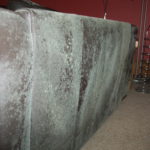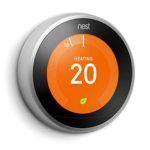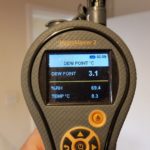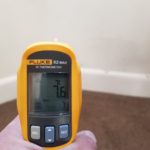How smart home technology can help reduce the risk of condensation and mould problems
December 14th, 2018
All posts, Condensation, Energy Efficiency / Insulation Improvements, Surveying
Over the past year or two I’ve recommended remote heating systems such as Nest or Hive to several clients most of whom are landlords suffering with mould / condensation problems in their let properties.
 As most will know mould and condensation problems are not just caused by poor ventilation, they occur due to an imbalance between a number of factors such as: moisture production, ventilation, atmospheric temperature, surface temperature and insulation deficiencies. Any imbalance between these can lead to humid conditions and the possible germination of mould.
As most will know mould and condensation problems are not just caused by poor ventilation, they occur due to an imbalance between a number of factors such as: moisture production, ventilation, atmospheric temperature, surface temperature and insulation deficiencies. Any imbalance between these can lead to humid conditions and the possible germination of mould.
Most homeowners and occupiers will naturally try to live in a manner that reduces the risk of moisture and mould problems arising through their life style choices however, for landlords lifestyle choices are often beyond their control, particularly when it comes to the control of heating.
A recent survey reminded me of exactly this scenario. It was a house of multiple occupancy, which had sufficient means of both natural and mechanical ventilation, was well insulated both walls and ceilings and incorporated a modern, efficient heating system. So why were the tenants complaining of mould.
The answer was simple, the tenants just don’t use the heating. During my survey I noted most of the radiators had been turned off and the house temperature was a shivering 8 degrees.It’s not as uncommon as you think and something I’ve encountered more and more recently.
When you consider the average debt of a student at university in 2018 is now around £34,800, as you would expect students are doing as much as possible to save money where they can. One obvious choice is to turn off the heating and put on another jumper.
Student loan statistics taken from statista: (https://www.statista.com/statistics/376423/student-loans-england-average-debt-on-entry-to-repayment-timeline/#0)
I’ve also recently recommended the same technology to a landlord who rented a property through Air B‘n’B and was having trouble with short stay tenants either not understanding the heating system or leaving it operational when they vacated wasting money and energy.
If a property is occupied but not heated the air temperature will be cold and is therefore unable to hold the water vapour produced via occupation, consequentially this means a much higher risk of condensation. The fabric of the building i.e. walls and ceilings also reduce in temperature thus meaning they are much more susceptible to mould.
 So, what are the implications for the landlord? Well, firstly disgruntled tenants complaining of mould and condensation which unbeknown to them, it could be their actions which are contributory to the problem and secondly potential damage to the fabric and decoration.
So, what are the implications for the landlord? Well, firstly disgruntled tenants complaining of mould and condensation which unbeknown to them, it could be their actions which are contributory to the problem and secondly potential damage to the fabric and decoration.
The Environmental Protection Act states that; building owners and landlords are responsible for providing a healthy living environment that is free of excess moisture and mould by ensuring proper building construction and maintenance. The occupants themselves are also responsible for managing the use of water, heating, ventilation and appliances in a manner that does not lead to dampness and mould growth.
Many landlords don’t live within reach of their rental properties as such, it’s not as simple for them to monitor the building and tenant’s lifestyle and provide advice or assistance where necessary. Similarly, landlords may not always be party to the electric and gas usage therefore may have no idea as to how effectively the building is being heated. This is where advancements in technology and particularly smart home devices can help.
Smart home technology can allow you to control the operation of your heating system from a remote location. Similarly, the technology can learn from your daily routine enabling the system to make the most energy efficient changes to your heating system. Most smart home heating systems also provide a monthly report, so you can see how efficiently your home is being heated and exactly how much energy is being used.
Now I’m not in anyway suggesting that landlords of permanently let properties take control of their tenants heating, that would simply be wrong. However, being able to view the heating report helps does help judge how efficiently the building is being heated.
 Similarly for our Air B‘n’B client, their problems were caused mainly by short term tenants not understanding the complex boiler thermostat, meaning most people choose to either just switch the heating on permanently or accidently mess up the timer schedule. These modern smart home devises are simple to use, designed to be familiar with almost everyone meaning they’ve had significantly less complaints about how to use the heating and have also able to control the system appropriately before and after a tenants stay.
Similarly for our Air B‘n’B client, their problems were caused mainly by short term tenants not understanding the complex boiler thermostat, meaning most people choose to either just switch the heating on permanently or accidently mess up the timer schedule. These modern smart home devises are simple to use, designed to be familiar with almost everyone meaning they’ve had significantly less complaints about how to use the heating and have also able to control the system appropriately before and after a tenants stay.
Obviously, the management of your heating system is only one aspect from a number of factors which help keep this delicate balance between lifestyle, vapour production and ventilation stable and I’m not suggesting in anyway that this is a resolution for all homeowners or landlords with condensation and mould problems. If however, your problems are either caused or contributed to by irregular heating, this maybe an option for you to consider.
As technology continues to evolve, we should take advantage of these developments and use their benefits to improve our lives and protect our investments.
Have a warm and cosy weekend.
Ps: This is not a sales pitch. I have no vested interest in advertising or selling smart home devices, I’ve simply found through recommendations in the right circumstances this technology can be of benefit to landlords of short and long terms lets.





